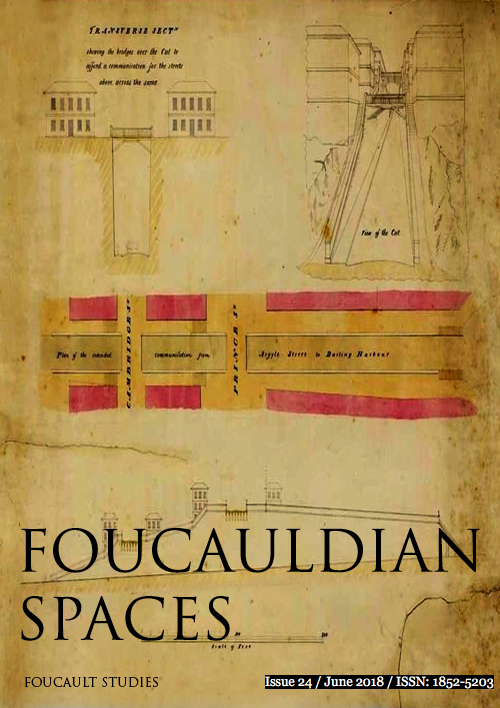South Africa as postcolonial heterotopia: The racialized experience of place and space
DOI:
https://doi.org/10.22439/fs.v0i24.5523Schlagworte:
Apartheid, Foucault, heterotopia, postcolonialism, South Africa, whitenessAbstract
This essay claims that heterotopia is characteristic of post-Apartheid South Africa, i.e. where heterotopia is usually the exception in society, it is the norm in South Africa. This claim reinterprets and expands Foucault’s concept: heterotopia here refers to the racialization of place and space, and hence to otherness and difference as primary. The ubiquity of heterotopia post-Apartheid is evident in the life-worlds of white suburbia and the black township. A case study is undertaken of white suburbia through a series of phenomenological descriptions of contemporary South Africa using heterotopia as a heuristic tool. This study demonstrates how Foucault’s notion of heterotopia is relevant but also too narrow when related to the postcolonial context. An expanded notion of the term as denoting a racialized experience of space and place is necessary for the purposes of coming to terms with the strangeness of post-Apartheid South Africa, where contradiction and otherness are the norm rather than the exception.
Literaturhinweise
• Achille Mbembe, On the Postcolony (Berkeley and Los Angeles: University of California Press, 2001)
• Angahrad E. Beckett, Paul Bagguley and Tom Campbell, “Foucault, social movements and heterotopic horizons: rupturing the order of things,”Social Movement Studies: Journal of Social, Cultural and Political Protest 20 (2016)
• Anine Kriegler and Mark Shaw, A Citizen’s Guide to Crime Trends in South Africa (Johannesburg and Cape Town: Johnathan Ball Publishers, 2016)
• Antjie Krog, “…between the nose and the mouth. Perhaps more towards the eyes,” in Some Afrikaners revisited, by David Goldblatt (Roggebaai: Umuzi, 2007)
• Antony Altbeker, A Country at War with Itself: South Africa’s Crisis of Crime (Johannesburg: Jonathan Ball Publishing, 2009).
• Charles Villet, “Donald Trump, white victimhood and the South African far-right,” The Conversation Africa, 23 February, 2017,https://theconversation.com/donald-trump-white-victimhood-and-the-south-african-far-right-73400.
• Charles Villet, “Loftus as Afrikaner heterotopia: The life world of rugbymentality,“ Image and Text, 19 (2012)
• Derek Hook and Michele Vrdoljak, “Gated communities, heterotopia and ‘rights’ of privilege: a ‘heterotopology’ of the South African security-park,” Geoforum 33 (2002). https://doi.org/10.1016/S0016-7185(01)00039-2
• Derek Hook, Foucault, Psychology and the Analytics of Power (London: Palgrave Macmillan, 2007)
• Donald Trump, “Inaugural address: Trump’s full speech,” accessed February 8, 2017, http://edition.cnn.com/2017/01/20/politics/trump-inaugural-address/
• Edward W. Soja, Postmodern Geographies: The Reassertion of Space in Critical Social Theory (London: Verso, 1989)
• Frantz Fanon, Black Skin, White Masks, translated by Charles Lam Markmann (London: Pluto Press, 2008 [1952])
• Frantz Fanon, The Wretched of the Earth, translated by Constance Farrington (London: Penguin Books, 1967 [1961]),
• Glenn Albrecht, “Solastalgia,” Alternatives Journal 32, 4/5 (2006)
• Greg Nicolson, “Farm attacks: If only the issue were just black and white,”Daily Maverick, August 25, 2015,https://www.dailymaverick.co.za/article/2015-08-25-farm-attacks-if-only-the-issue-were-just-black-and-white/#.WKQdm9J96Hs
• Henri Lefebvre, The Production of Space, translated by Donald Nicholson-Smith (Oxford: Blackwell Publishing, 1991 [1974])
• John Comaroff and Jean Comaroff, Theory from the South: Or, How Euro-America is Evolving Toward Africa (Boulder, Colorado and London: Paradigm, 2012).
• Kevin Hetherington, The Badlands of Modernity: Heterotopia and Social Ordering (New York: Routledge, 1997). https://doi.org/10.4324/9780203428870
• Lewis R. Gordon, Fanon and the Crisis of European Man: An Essay on Philosophy and the Human Sciences (New York: Routledge, 1995).
• Lloyd Phillips, “Farm murder figures – TAU SA,” Farmer’s Weekly, April 28, 2015, http://www.farmersweekly.co.za/agri-news/south-africa/farm-murder-figures-tau-sa/.
• Michel Foucault, “Different Spaces,” translated by Robert Hurley, inEssential Works of Michel Foucault 1954 – 1984, Volume 2: Aesthetics, Method and Epistemology, ed. James Faubion (London, Penguin: 1998 [1967])
• Michel Foucault, “Of Other Spaces,” translated by J. Miscowiec, Diacritics26.1 (1986 [1967])
• Michel Foucault, The Order of Things (London: Routledge, 1989 [1966])
• Nickolaus Bauer, “Red October: The Plight of Whites in the New South,”ENCA, October 10, 2013, http://www.enca.com/south-africa/red-october-plight-whites-new-south-africa.
• Noel Stott, “From the SADF to the SANDF: Safeguarding South Africa for a better life for all?,” Violence and Transition Series, Vol. 7, (Centre for the Study of Violence and Reconciliation, 2002),
• Pedro Tabensky, “The Oppressor’s Pathology,” Theoria, 57 (2010)
• Peter Johnson, “History of the Concept of Heterotopia” (revised),Heterotopia Studies (website), http://www.heterotopiastudies.com/wp-content/uploads/2015/12/Brief-History-of-the-Concept-of-Heterotopia-word-dec-2016-pdf.pdf (2016)
• Peter Johnson, “Unravelling Foucault’s Different Spaces,” History of the Human Sciences 19.4 (2006)
• Peter S. Goodman, “End of Apartheid in South Africa? Not in Economic Terms”, New York Times, 24 October, 2017,https://www.nytimes.com/2017/10/24/business/south-africa-economy-apartheid.html?smid=fb-share
• Richard Peet, Modern Geographical Thought (Oxford: Blackwell Publishing, 1998)
• Robyn Marasco, The Highway of Despair: Critical Theory after Hegel(New York: Columbia University Press, 2015)
• Samantha Vice, “How Do I Live in This Strange Place?,” Journal of Social Philosophy 41.3 (2010)
• Sampie Terreblanche, A History of Inequality in South Africa, 1652 – 2002 (Scottsville: University of Natal Press, 2002)
• Savo Heleta, “White privilege and hypocrisy in South Africa”, Africa is a Country, 6 November, 2016, http://africasacountry.com/2017/11/white-privilege-and-hypocrisy-in-south-africa/.
• South Africa Survey 2016, edited by Frans Cronje and John Kane-Berman (Johannesburg: South African Institute of Race Relations)
• Thomas L. Dumm, Michel Foucault and the Politics of Freedom (Walnut Creek, California: AltaMira Press, 2000)
• Tony Schirato, Geoff Danaher, and Jen Webb, Understanding Foucault, 2nd ed. (London: Allen and Unwin, 2012)
Downloads
Veröffentlicht
Zitationsvorschlag
Ausgabe
Rubrik
Lizenz
Authors retain copyright to their work, but assign the right of the first publication to Foucault Studies. The work is subject to a CC BY-NC-ND 4.0 license, but despite these restrictions, authors can take for granted that Foucault Studies will permit articles published in Foucault Studies to be translated or reprinted in another format such as a book providing a full reference is made to Foucault Studies as the original place of publication.



